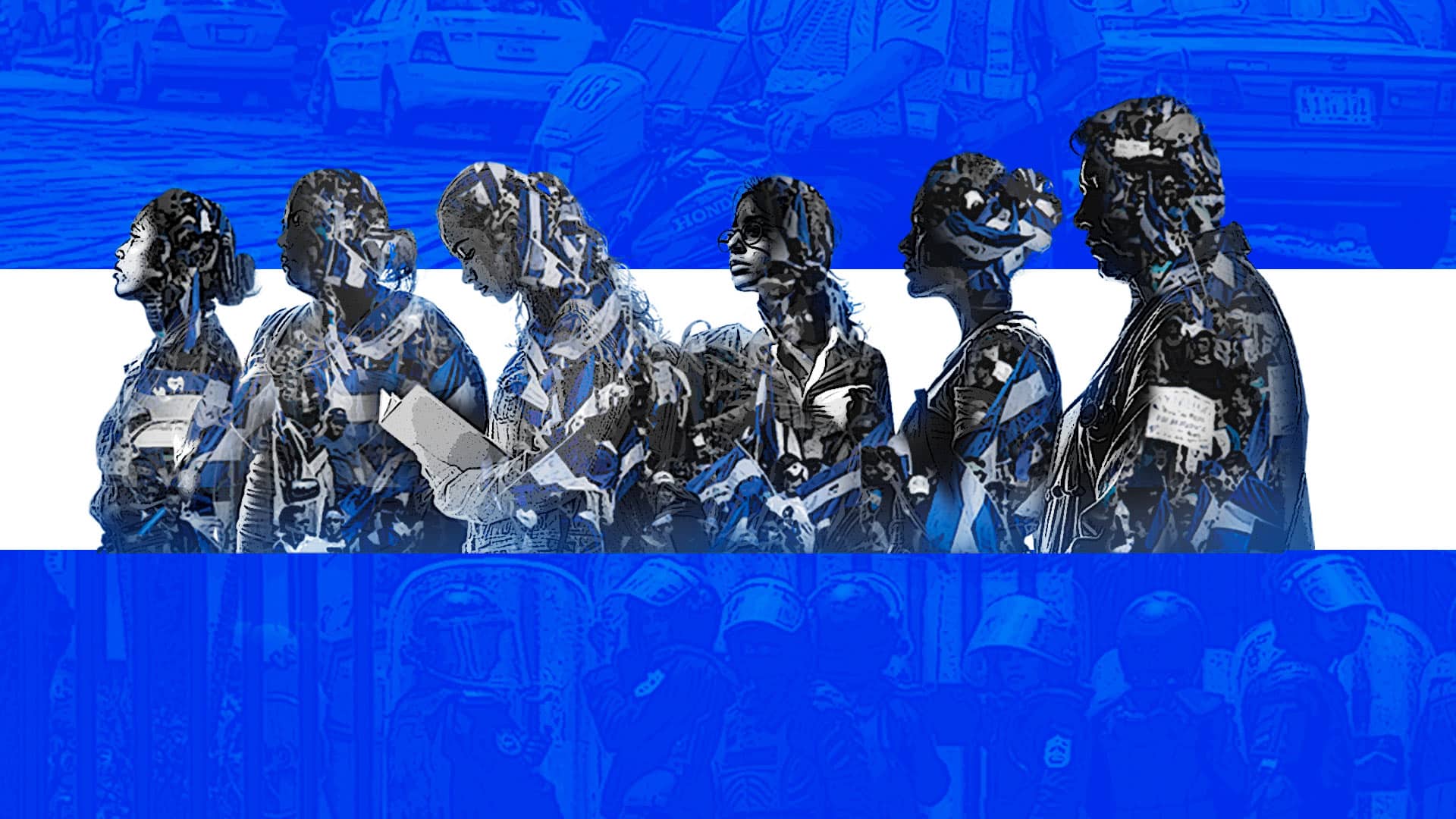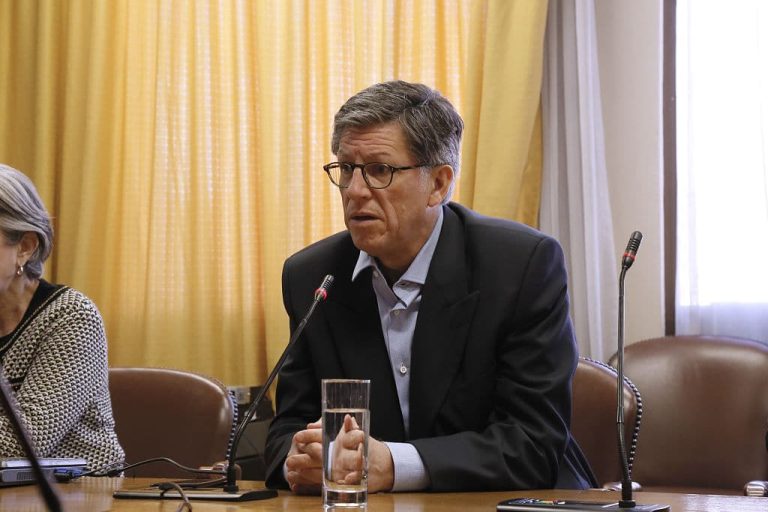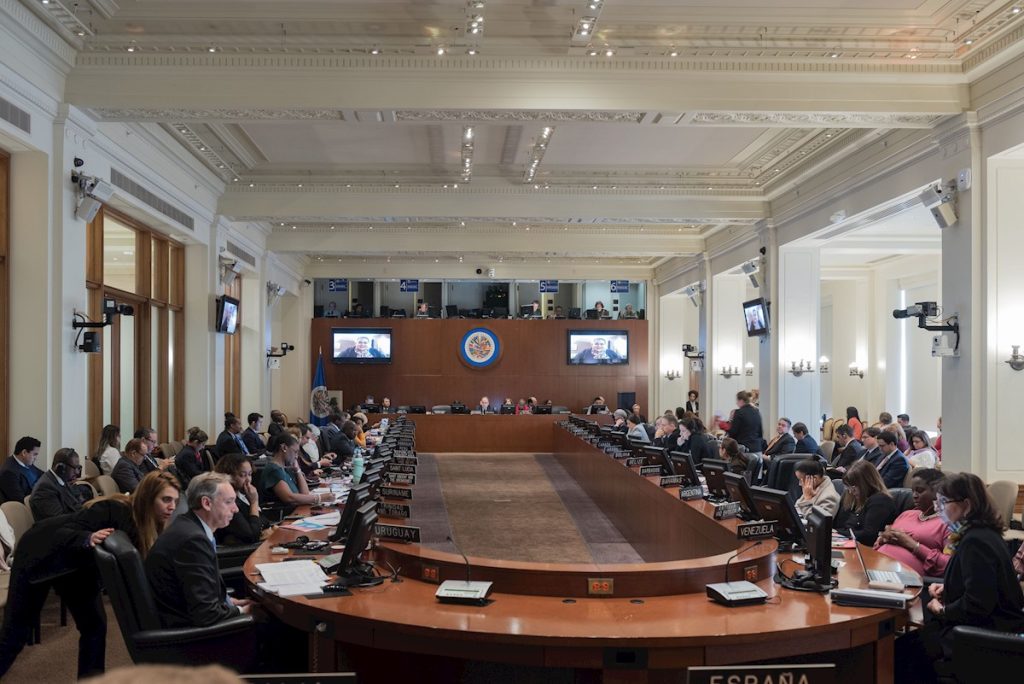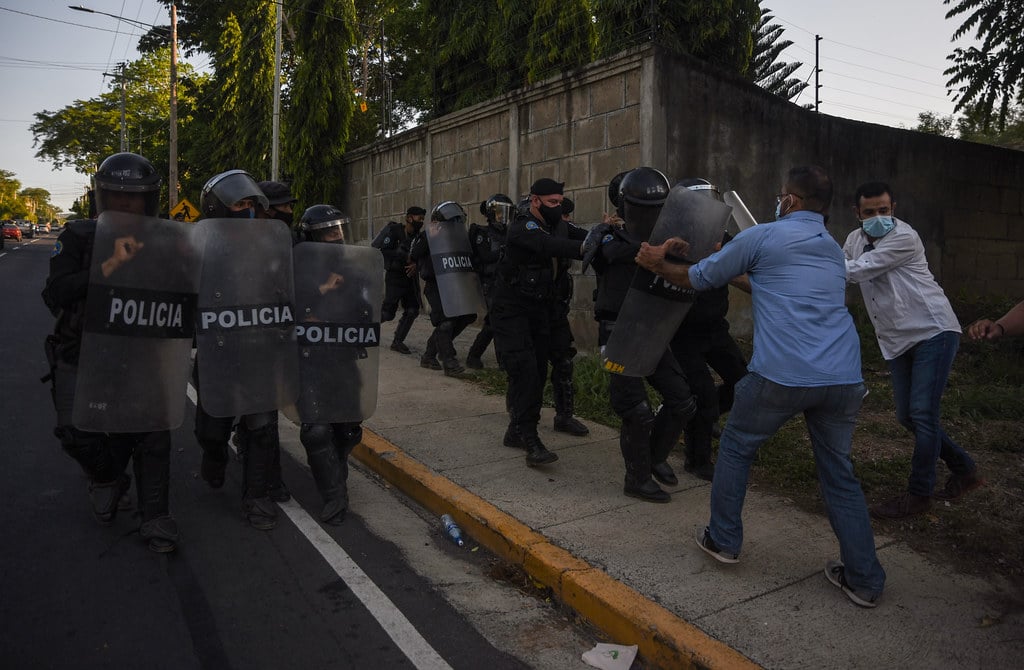21 de junio 2021

Six Years With April in Tow: Life Under Nicaragua's New 'Normal'

PUBLICIDAD 1M
PUBLICIDAD 4D
PUBLICIDAD 5D
HRW Americas Director: the international community knows that in Nicaragua “there is an unabashed exercise of power” by Ortega and Murillo

“Ortega is betting on international fatigue; I hope that Boric in Chile
The director for the Americas of Human Rights Watch, Jose Miguel Vivanco, sees a “global consensus that in Nicaragua we are facing a cruel regime that is clinging to power and has openly become a dictatorship.” He believes it will end up becoming “an international pariah.”
Following the resolution of the Organization of American States (OAS) against the regime of Daniel Ortega and Rosario Murillo, Vivanco said the efforts of the regime to justify the arrest of 16 opposition leaders and from the private sector, in recent weeks, “are not taken seriously” by any democratic government.
Likewise, he argues that with the large amount of information that exists about Nicaragua, “everyone knows that there is a blatant abuse of power by the dictators and that what they are doing is paving the way to steal the next presidential elections.”
During an interview on the Esta Noche program, Vivanco warned that even though Ortega and Murillo “exercise power in a brutal way,” they are planning to “steal the elections” with “the fantasy” that in this way “they will repair, to some degree, the legitimacy they’ve lost.”
However, he affirms that the regime “lacks legitimacy” and the OAS resolution, with the favorable vote of 26 countries, allows the discussion on the political crisis in Nicaragua to be moved to the United Nations.
Vivanco believes that the sanctions imposed by the United States, Canada and the European Union on officials of the regime “are not enough.” He said it is necessary to “continue gradually increasing the pressure.”
Of the 16 detained in the last two weeks in Nicaragua, at least 12 of them have not had any communication with their families or with their defense lawyers. They are completely kidnapped and isolated. How do you assess this situation from the perspective of the right to defense and human rights?
What is happening in Nicaragua should not surprise us because we are not facing a democratic system where some excesses and mistakes have been committed. We are facing a family dictatorship in which they are the ones who decide and has the power to do so. Who is imprisoned, who can be given a little water and oxygen, under what circumstances are they detained, who are sent to El Chipote and whether they are allowed to receive food and medicine.
In other words, it is the realm of total tyranny, of the administration of power in a capricious way. It all depends on whether Mr. (Daniel) Ortega or Mrs. (Rosario) Murillo are in good mood or in a bad mood, and on other tactical calculations. Since they are a couple who wields power in a brutal way and are essentially tactical, they use a kind of military vision in exercising power.
They have decided to kidnap and hold these people hostage, even though they are innocent people and to whom they cannot prove anything. Since they control Congress, control the Judiciary, the Public Ministry, the Police and the Army, they can do it and not be accountable to anyone.

Fotografía cedida por la Organización de Estados Americanos (OEA) que muestra una vista general del pleno del Consejo Permanente durante una reunión en la sede del organismo en Washington. // Foto: OEA
How do you assess the censure that occurred yesterday (Tuesday) at the OAS, in which 26 countries condemned the regime, and demanded the release of the detainees? Is this a fundamentally a human rights or a democracy issue?
Both. Here we are facing a flagrant violation of the Inter-American Democratic Charter. One of the basic principles of the democratic charter is to guarantee a free, competitive, transparent electoral process, which is not happening and is not going to happen in Nicaragua, precisely that. What Ortega and Murillo are planning is simply to steal the elections in any way on November 7th and thus buy a new term, with the fantasy that doing it this way will repair, to some degree, the legitimacy that they have lost.
I do not think they realize that they no longer have any legitimacy, as a result of the massacres and the atrocities that are attributed to them since 2018. Now, the arrests ordered by the regime, of important opposition leaders and important members of civil society and the private sector, simply increases this discredit at the international level. That was demonstrated by a very important, very solid vote at the OAS, in which 26 States, with some regrettable exceptions, chose to condemn and demand the immediate release of both the political leaders and the others who have been arbitrarily arrested.
However, three countries abstained: Honduras, Mexico and Argentina. How do you assess this stance of Mexico and Argentina? Can it have any repercussions in the rest of the continent?
I don’t think so. Honduras’ decision is easy to interpret because it is a country that everyone knows is today practically in the hands of the cartels and what it is doing is trying to avoid that in the future there is a similar scrutiny of a regional type regarding the internal practices of the government of Honduras.
Now, the decision made by Argentina and Mexico, that also produced a separate text, one that is full of contradictions, which seems to be taken from a libretto by the great Mexican actor, Cantinflas, due to the lack of rigor from an intellectual point of view, where the position of Argentina is not serious.
But in fact, what they try to do is invoke the principle of non-interference in internal affairs and they start from the premise that the free exercise of internal democratic institutions must be respected. When it is evident in the light of all information available from the OAS itself, the United Nations, local non-governmental organizations, the national and international press, and organizations like ours, that there are no such democratic institutions in Nicaragua.
In practice, what Argentina and Mexico do is defend Ortega’s right to do whatever he wants and that is what they call respect for non-interference and for the local institutions that obey those who are currently exercising power in Nicaragua in a brutal and willful way.
Where does the OAS balance point to? What are its next steps? This resolution talks about follow-up, of even calling a foreign ministers’ assembly, but in Nicaragua the raids continue, and the pressure continues on different sectors of the country. Can the OAS reach a consensus to adopt other types of pressure actions against Nicaragua?
I think so. What reality so far shows is that individual sanctions, those that have been adopted by both the United States and the European Union, aimed at cancelling visas and freezing assets obtained through corruption are not sufficient. Those sanctions that have even affected the Ortega family are not enough.
The statements of condemnation and rejection from Joseph Borrell, as the European Foreign Minister, or Anthony Blinken, the Secretary of State of the United States, or the resolution adopted June 15th by the OAS; they are not enough either because Ortega continues to advance in his strategy of capturing people, who knows who will be the next to be arbitrarily taken to El Chipote. We must gradually continue to increase the pressure. There is no other way. We must make these events visible, denounce them and redouble international pressure.
I think that this OAS resolution is very important, because it allows us to go to a new forum and that is the United Nations. To take the matter to the Secretary General of the United Nations himself… We want Secretary General Antonio Guterres to take a more visible leadership in this matter. For the United Nations to take action on the matter, neighboring countries, the countries of the region, must already have a position, a statement. In that sense, I believe that the OAS resolution demanding the immediate release (of all the political prisoners) and the cessation of repression, helps a lot to be able to move this discussion to the international forum per excellence, which is the United Nations.

Policías antimotines empujan con violencia a ciudadanos y periodistas durante el allanamiento a la casa de Cristiana Chamorro, el 2 de junio, en Managua. // Foto: Nayira Valenzuela | Confidencial
The Government of Nicaragua has tried to justify this repression under the argument that they are the object of an international conspiracy. On the other hand, the propagandists of the regime openly say that they are capturing these hostages because they want to force the United States to negotiate with President Ortega. However, it is known that United States diplomats have offered to dialogue with the regime and there has been no interest. In other words, what is at stake is perhaps a possible political dialogue before Ortega is re-elected or after his reelection.
I believe that the explanations or attempts at justification that the regime gives to this type of abuse of power are laughable and are not taken seriously by any player, by any country or democratic government in the world.
This attempt to cover these facts because of a great conspiracy against Nicaragua is the typical (justification) of dictators, wrapping themselves in the national flag and confusing their own and family interests with the national interests.
I think the discourse presented by Mr. (Denis) Moncada, Ortega’s foreign minister, is really very poor. It is loaded with cliches. They are simple slogans that were typical of the Cold War but that at this stage, with the degree of information that exists on Nicaragua thanks in large part to globalization, everyone understands and knows that there is here an unabashed exercise of power by this couple of dictators. And that what they are doing is clearing the way to ensure stealing the next presidential elections in plain sight of everyone.
You mentioned that the lack of legitimacy of the regime is obvious and that this illegitimacy could be further aggravated in a reelection without political competition, under a police state, with hostages. However, Ortega could be trying to see himself in the mirror of countries that have survived, at least in the short-term, that lack of legitimacy. How do you assess this regime’s calculus of overcoming illegitimacy in the short term?
Someone has to explain to Ortega that Nicaragua is not Venezuela. Venezuela had for many years the muscle that made it possible to resist, sustain itself and spread the Bolivarian model in the rest of Latin America and that has a remarkable explanation. And it is the fact that Venezuela has the most important oil reserves in the world and not just those, also in precious minerals. We are talking about a world power in terms of scarce and very valuable natural resources. Today Venezuela is ruined, but it still has those resources and has the capacity to sustain itself. Nicaragua is not in those circumstances.
There will be others, perhaps Ortega himself, who think that since Cuba has managed to survive the US embargo and unilateral sanctions for 60 years, he too could stay in power. It is probable that he has that fiction in his head; however, it should also be explained to him that Cuba was a unique case in the world, that it has indeed been the subject of unilateral sanctions by Washington, but that these sanctions have not had any impact to a large extent because public opinion and the international community is divided on the issue of Cuba.
Cuba is not isolated from Canada, nor from Europe, nor from the rest of Latin America. But in the case of Nicaragua, I think there is a global consensus, not of sanctions, but certainly that we are facing a cruel regime. A regime that is clinging to power and that has openly become a dictatorship that is using the force and power that it has in its hands to persecute and repress.
However, this cruel, dictatorial regime, which keeps the murders it committed in impunity, manages the economy reasonably well and maintains a private economy that has not been nationalized, as Venezuela did and as has been done in Cuban system. Can this regime without legitimacy maintain any viability without free elections, without competition and with this human rights crisis, managing that private economy?
It is possible that the economists who advise the regime can assure Ortega and Murillo that there are enough reserves to sustain themselves for a good while. But that is not a country plan. That has no future. That is not a way to govern and to be able to promote the cause that they claim to defend or try to expand in Nicaragua and at the same time gain international recognition.
I think that the way things are going, like other dictatorships where, for example, in Africa, the owners of the country have appropriated power and also have financial conditions to sustain themselves for a long time, what will inevitably happen in the case of Nicaragua is that they will simply become a pariah at the international and regional level. I don’t think with this model, this strategy, Ortega can recover anything. I think he will continue to lose support and reap questioning at the international level, even from multilateral development organizations such as the big banks, both in Europe and here in Washington.
This article was originally published in Spanish in Confidencial and translated by Havana Times
Archivado como:
PUBLICIDAD 3M
Confidencial es un diario digital nicaragüense, de formato multimedia, fundado por Carlos F. Chamorro en junio de 1996.
PUBLICIDAD 3D